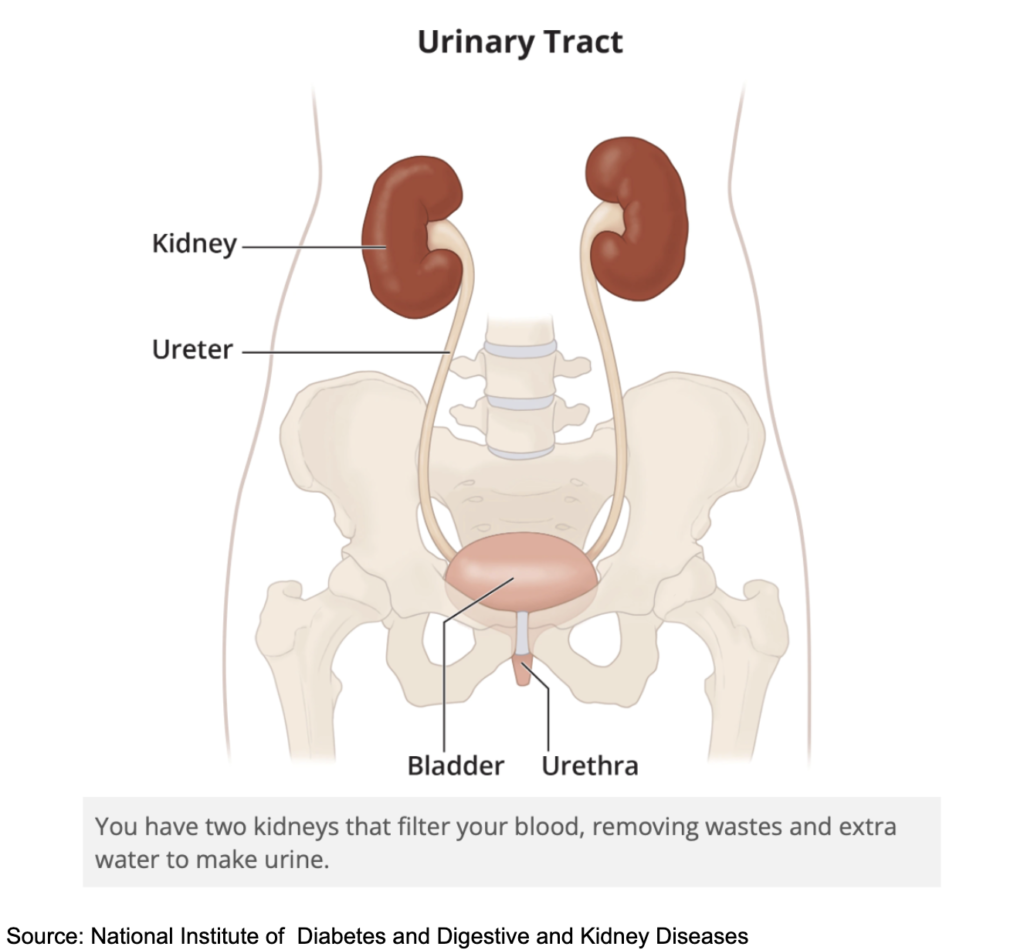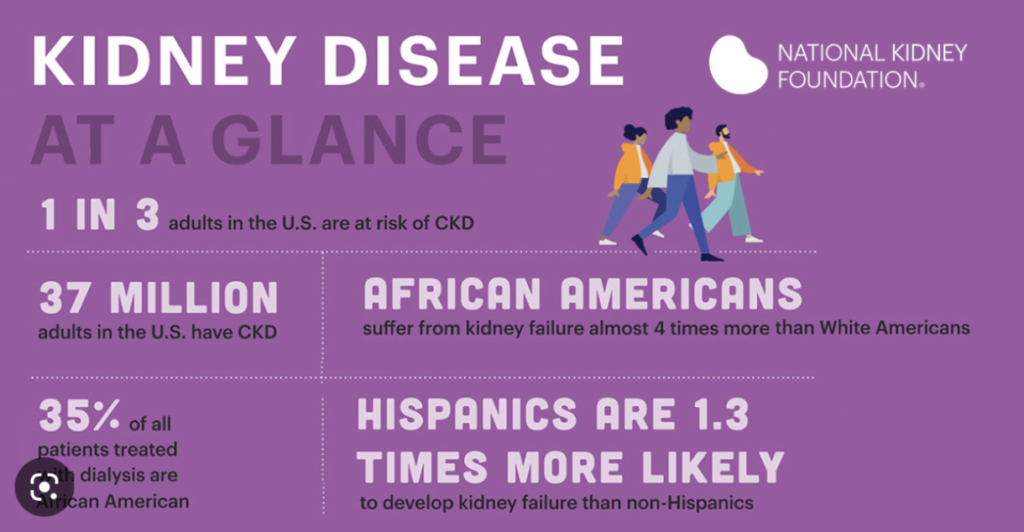kidney disease
early detection saves lives
Black Americans suffer from kidney disease and kidney failure almost 3 times more than Whites.
kidney disease
early detection saves lives
Black Americans suffer from kidney disease and kidney failure almost 3 times more than Whites.
What is kidney disease?
- The kidneys remove waste, toxins, and excess fluid from the body by filtering the blood.
- They also help control blood pressure, stimulate production of red blood cells, keep your bones healthy, and regulate blood chemicals that are essential to life. (CDC)
- Kidney disease (Chronic Kidney Disease) happens when the kidneys become damaged and can no longer effectively filter blood.
- Kidney diseases are a leading cause of death in the United States.
- About 37 million US adults are estimated to have CKD, and most are undiagnosed.
- Every 24 hours, 360 people begin dialysis treatment for kidney failure.
- In the United States, diabetes and high blood pressure are the leading causes of kidney failure, accounting for 3 out of 4 new cases.
symptoms
- Nausea
- Vomiting
- Loss of appetite
- Fatigue and weakness
- Sleep problems
- Chronic Headaches
- Increase/Decrease urination
- Decreased mental sharpness
- Muscle twitches and cramps
- Swelling of feet and ankles
- Persistent itching or numbness
- Chest pain
- Shortness of breath
- High blood pressure (hypertension) that is difficult to control
- Dry Skin
Risk Factors
- Diabetes. This is the leading cause of kidney disease. High blood sugar can damage the blood vessels in your kidneys.
- High Blood Pressure. This is the second largest cause of kidney disease. High blood pressure weakens the blood vessels in the kidney, leading to kidney damage.
- Heart Disease.
- Obesity.
- Your Race. African Americans, Hispanics, and Native Americans have a greater risk for Kidney Disease.
- Your Age. Your chance of having kidney disease significantly increases after age 60.
- Your Genetics. Some African Americans are born with a “high risk” gene. People born with this gene are twice as likely to develop kidney disease and progress to kidney failure.
- Family history of kidney disease
Ways to Prevent
- Regularly visit your doctor for check ups. Ask your doctor about your kidney health.
- Make healthy food choices. Incorporate fresh vegetables, fruits, and whole grains into your daily diet.
- Try to engage in physical activity for 30 minutes per day.
- Stop smoking.
- Limit your alcohol consumption. Overindulging in alcohol can increase your blood pressure.

Who is at RisK?
- African Americans constitute 35% of all kidney dialysis patients, but only represent 13.2% of the population.
- African Americans are twice as likely to be diagnosed with diabetes, which is a leading cause of Kidney Disease. The stigma around seeing a doctor can contribute to the late-stage recognition of the disease.
- The best thing you can do to prevent Kidney Disease is to regularly visit your doctor and request a simple urine test.
treatment
Chronic Kidney Disease often has no cure. Treatment options usually consist of measures to help control symptoms, reduce complications, and slow the progression of the disease, such as dialysis. If the disease progresses, you may require treatment for end-stage kidney disease.
Your doctor can gather information about your kidneys from urine and blood tests during your annual wellness visit.
- Use an at home test:
- Urine test strips- a quick way to determine kidney function and measure other various health parameters.
- Finger prick test- take your sample, return it to the lab, and receive your results in 2-5 days
Find out if you are at risk for kidney disease: https://www.kidney.org/kidney-quiz/
What to do if you are at risk?
- Contact your primary care physician for a checkup.
- You may be referred to a Nephrologist, a doctor that specializes in conditions that affect the kidney.
STATISTICS FOR PEOPLE OF COLOR

- Black Americans suffer from kidney disease and kidney failure almost 3 times more than Caucasians
- Diabetes and hypertension are the leading causes of kidney failure in African Americans.
- More than 1 in 3 kidney failure patients living in the United States are African American. (American Kidney Fund)
- Black or African Americans are more than 3 times as likely and Hispanics or Latinos are 1.3 times more likely to have kidney failure compared to White Americans.
Learn more about the Stats at GRAAHI's Health Equity Index
Links, Tools, Resources
Grand Rapids/Kent County/Michigan Resources:
Latest Advances, Clinical Trials & Breakthroughs in Kidney Disease:
https://www.uptodate.com/contents/whats-new-in-nephrology-and-hypertension
https://www.frontiersin.org/articles/10.3389/fped.2021.743301/full
Sources:
https://www.niddk.nih.gov/health-information/kidney-disease/kidneys-how-they-work, https://www.niddk.nih.gov/health-information/kidney-disease/kidneys-how-they-work, https://www.kidney.org/atoz/content/minorities-KD, https://www.cdc.gov/kidneydisease/publications-resources/ckd-national-facts.html

